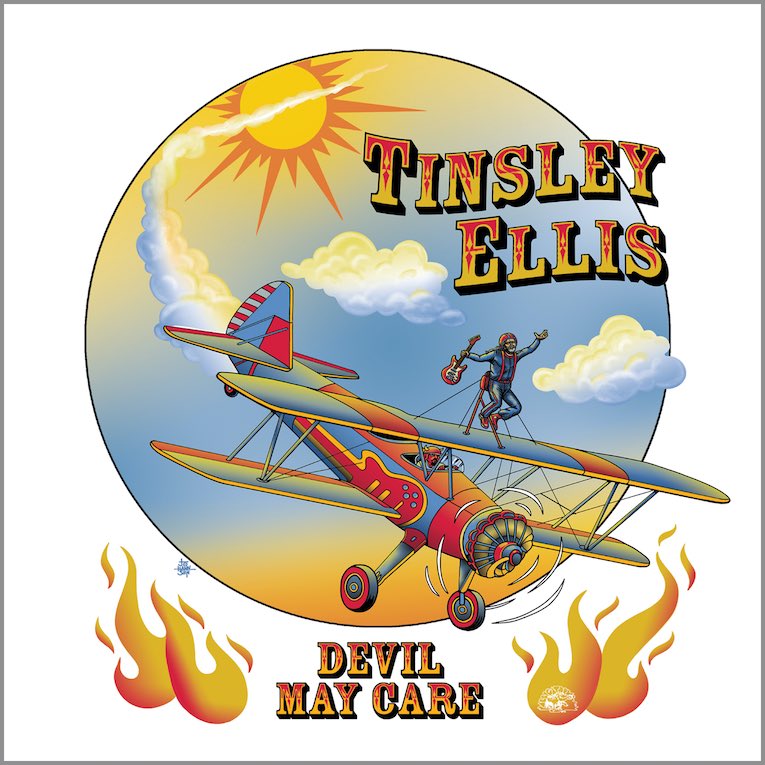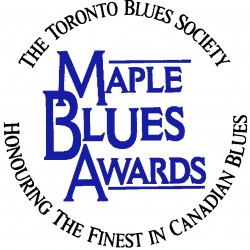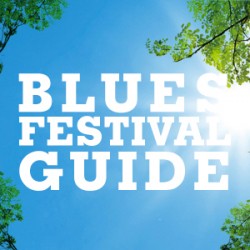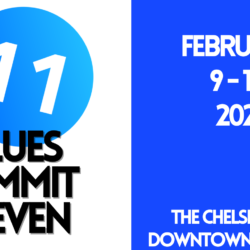Tinsley Ellis – Devil May Care
If you’re intrigued by the potential of Southern Rock married to red-hot electric blues, meet your new favourite artist – and start digging into his impressive 20-release catalogue.
It’s a fact that exceptional guitarists rarely sport exceptional singing voices. The Atlanta-born Ellis, however, could earn a living from his passionate singing alone – but it’s his ferocious abilities in his accompanying guitar work which distinguishes him in both blues and rock circles. The emotion-drenched sounds he wrests from his guitar – and his voice – firmly seats him as hailing from the south. Ellis’ other not-so-secret weapon is that he’s also joined at the hip with his bandmates, having forged an intimate chemistry that’s as obvious on-record as it is on-stage: Kevin McKendree (organ/piano), Steve Mackey (bass) and Lynn Williams (drums). Guests on sax (Jim Hoke) and trumpet (Andrew Carney) on three tracks help transform this already tight quartet into a full-on orchestra for added wallop.
Ellis’ connection to the South has never been closer than with the strains of the opening track, “One Less Reason”. Deftly layering multiple guitar tracks together, makes for an Allman-esque moment that, when coupled with Ellis’ soulful rasp of a voice, is all about geography. A tight rhythm section and the majesty of McKendree’s B3 underline each song with utter confidence. “Right Down The Drain” follows with bluesy, deep-dish slide guitar which melds with McKendree’s piano and secondary guitar like it’s a calling.
As blistering and consistent a guitarist as Ellis is, it seems that each album’s highlights occur when the pace is slowed down. “Just Like Rain” is one of these and its blend of acoustic guitar, B3 as the storyteller’s voice adds cement to every ounce of its heartfelt groove. The addition of horns lends a larger landscape in which every paint stroke makes for a highly enticing whole. “Beat The Devil” surrenders to Ellis’ more gentle side, nailed to the ground by Williams’ crisp drumbeat and Mackey’s sinuous basslines. Again, the guest horns create added body, setting up contrast for each of Ellis’ fiery solos. “Don’t Bury Our Love” may suggest that it’s too late to care, yet Ellis and Co. take full advantage of its slow pace. As McKendree’s soulful organ builds a solid foundation, Ellis’ stirring vocal joins together with the impassioned guitar solos which follow – another stand-out track. Some might hear a reference to sometime-Southerner, Al Kooper, and his “I Love You More Than You’ll Ever Know”. In a somewhat peculiar twist, the opening slide guitar found on the intro to “Juju” triggers a jarring double-take – its very framework akin to the Allman’s “Ain’t Wastin’ Time No More” – an uncanny resemblance. Even McKendree’s piano sounds true – until the chorus. Tribute? They’re all friends but this seems a misstep. The gentle B3 and acoustic guitar intro to “Step Up” soon flashes to an energetic guitar and sax-driven funk-fest, with a tip-o’-the-hat to Albert Collins. The horn section reappears on the show-stopping “One Last Ride” as Ellis takes it slow, allowing the song to develop, mixing in more Allman-isms, drenching it with McKendree’s moody B3 and electric piano and adding tasty guitar solos which swell in intensity. “28 Days” is a fast-tempo rocker utilizing a wah-wah pedal, sharp stabs of B3 as it highlights his scorching rhythm section. The closer – the delicious “Slow Train To Hell” – offers another slow-burn, Texas-flavoured blues jam which showcases each player as it provides Ellis the perfect playing field to amp up his unerring, soulful charm. If this is ‘hell’, let’s go! (Eric Thom)










